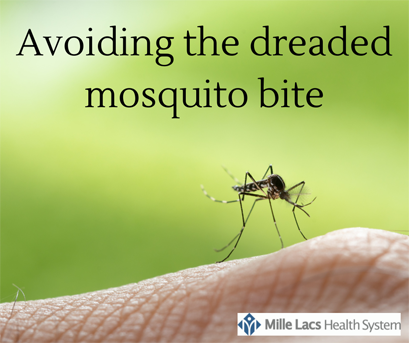Avoiding the dreaded mosquito bite
June 17, 2022
Minnesota has over 50 species of mosquitoes, and as many as half of those varieties bite humans. Mosquito types vary on when they appear (time of day or time of year), what kinds of diseases they can spread, whether they prefer humans, birds, horses, etc to bite, and much more.
A mosquito bite can leave behind an annoying, itchy red bump, but it can also spread disease. There are three common diseases spread by mosquitoes in Minnesota: West Nile Virus, La Crosse Encephalitis, and Jamestown Canyon Virus. The highest risk period when mosquitoes may spread disease to humans in Minnesota is mid-summer through early fall (July – Sept). Individuals most susceptible to falling ill from a mosquito bite are the young and old populations, as well as those with weakened immune systems. On the bright side, the most common type of mosquito that bites humans in Minnesota usually doesn’t carry disease.
There are many things you can do to lower your risk of getting mosquito bites when outdoors. The first thing to consider is the time of day. Many mosquitoes are most active at dawn and dusk, although there are a few varieties out during the day.
When outside, start with protecting your skin with long sleeves and pants, and choose lighter colors, as mosquitoes tend to be more attracted to darker clothing. Protecting your skin with a bug spray containing 20% - 30% DEET is highly effective in repelling biting bugs such as mosquitoes and ticks. If you need to use sunscreen at the same time, be sure to apply sunscreen first, then about 20 minutes later apply the bug repellent.
Mosquitoes need water to breed. Removing standing water or regularly refreshing water can help keep the mosquitoes away. Freshening bird baths, children’s wading pools, and unclogging roof gutters are a good start. A helpful tip to keeping the mosquitoes outside when you’re inside your home is to check window screens for any tears that need repair.
Getting an occasional mosquito bite this summer is almost inevitable no matter how many steps you take to avoid them. When you get the urge to scratch, avoid doing so as excessive scratching can lead to infection. Instead, you can soothe the itch at home. Washing with soap and water is a good start, and try applying a cool compress to the itch, calamine lotion, or nonprescription hydrocortisone cream to help relieve the discomfort.
